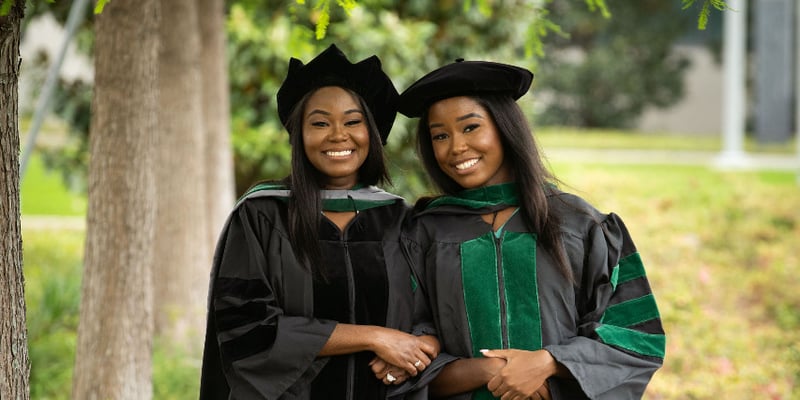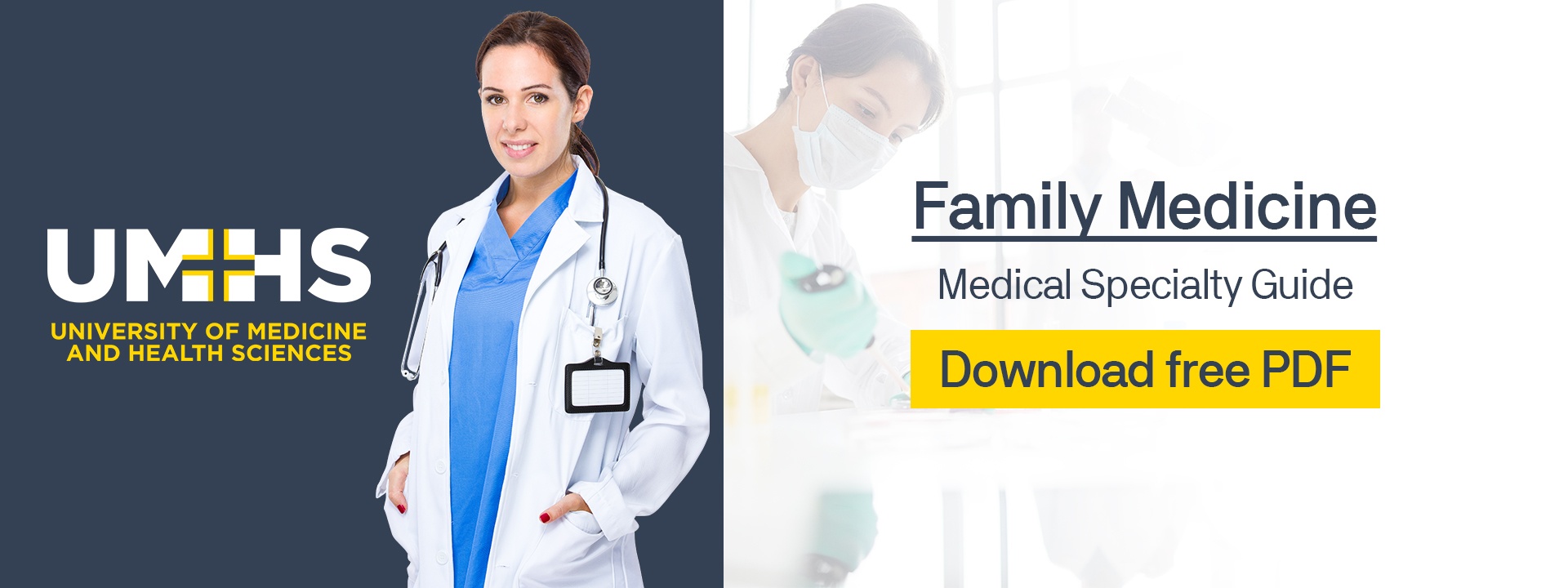UMHS Class of 2020 graduate Dr. Cynthia Kudji had a doubly delightful surprise on Match Day last month. She matched in Family Medicine at LSU Health in Louisiana and learned that her daughter, Dr. Jasmine Kudji, also matched at LSU in General Surgery. It was a huge thrill for the mother and daughter doctor duo because after years studying medicine at a distance—Cynthia was in St. Kitts and Maine at UMHS while her daughter Jasmine was at LSU School of Medicine in Louisiana—the two will be working in the same hospital system starting July 1, 2020. These groundbreaking women are the first mother and daughter to attend medical school at the same time and match at the same institution
The mother and daughter doctor duo took time to speak to the UMHS Endeavour via telephone, enthused about sharing their inspiring story in this very unusual spring of 2020, a time when the COVID-19 pandemic is killing thousands in the U.S. and doctors are so desperately needed on the front lines.
Dr. Cynthia Kudji, originally from Ghana, West Africa, has come a long way from being a 23-year-old student and pregnant with daughter Jasmine, when she had to put dreams of becoming a doctor on the back burner. She eventually became a nurse and worked as an RN and a Nurse Practitioner for nearly a decade before deciding to attend medical school. The UMHS Endeavour spoke to Dr. Kudji about her journey through medical school at UMHS and how outstanding professors and staff made a big difference for her as a nontraditional student. In addition, she and daughter Dr. Jasmine Kudji talked about the unique challenges of working during the COVID-19 pandemic, why African Americans have been especially affected by the virus, and more.
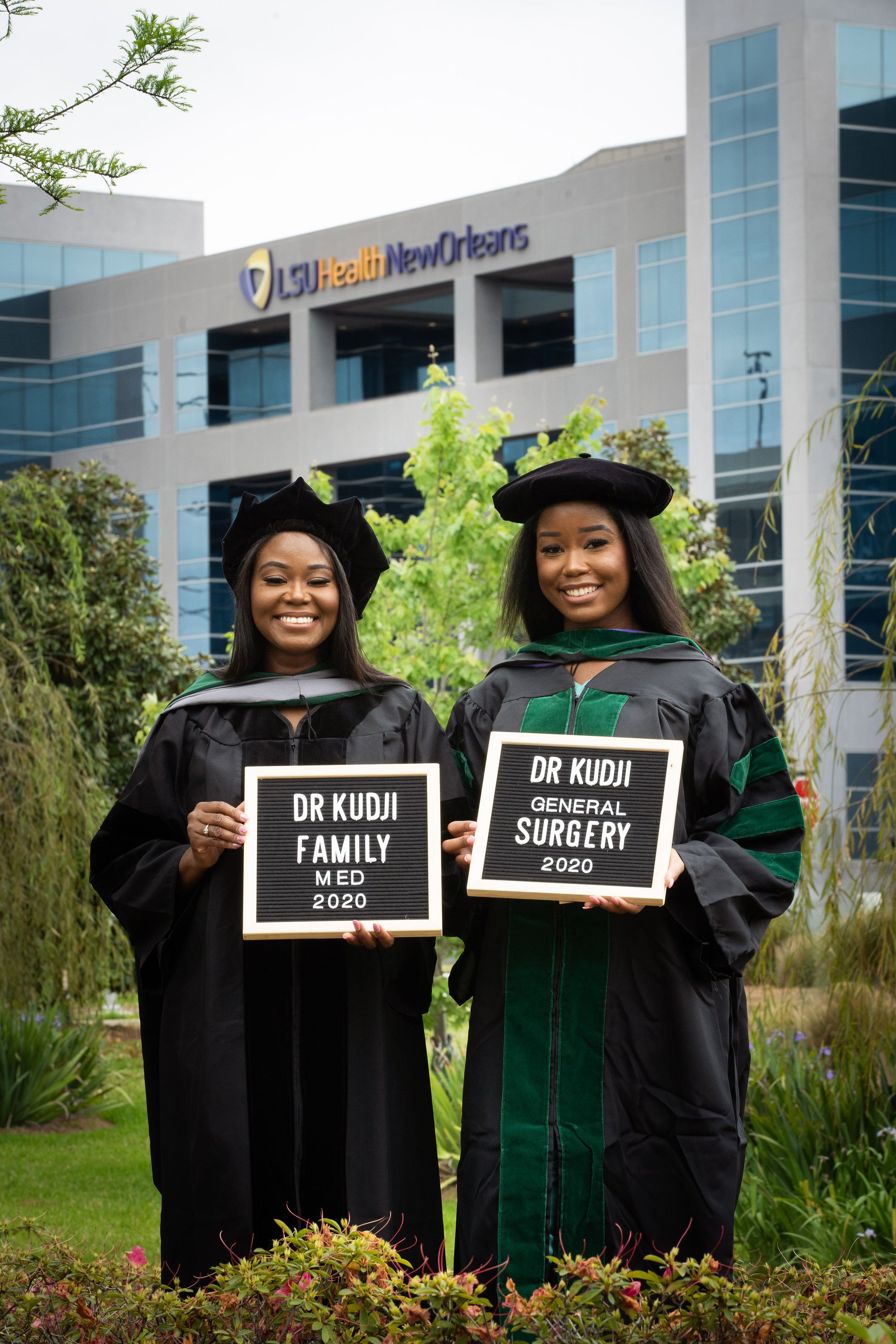
Dr. Cynthia Kudji & Dr. Jasmine Kudji proudly display their residency announcements at LSU Health New Orleans. Photo: Adrienne Battistella.
Trip to Ghana Inspired Career in Medicine
Dr. Kudji admits she didn’t always plan on becoming a doctor. When she was young, there were few physician role models on TV for African Americans.
“I remember when we were young there were TV shows like ‘The Cosby Show’ and ‘A Different World,’” she said. “Seeing African Americans in college or being successful was like firsts. So, for me it wasn’t like ‘Oh, yes, I want to be a physician’. It was more like, ‘Oh, no, can I really do this? Or, ‘Am I smart enough to do it?”
Dr. Kudji was born in the village of Kenyasi in Ghana and came to the United States at age two. It was during a trip back to Africa to visit relatives that she was inspired to become a doctor.
“My mom wanted us to have a family trip back to Ghana and there was an incident where we were in the village and somebody just walked up to us and said that their child had a fever and was sick and wanted my mom and I to help. We put the child in water, trying to get the temperature down, and that’s pretty much all I remember. The last thing I did was ask how the child fared out and she was like ‘I don’t think the child did very well’ and I just remember being so frustrated that the mom had to come to a complete stranger to get access to health care. The only thing I knew that could change that situation was to be a physician. That drove the whole line of thought to ‘Hey, I would love to be a physician.’”
At the time, she did not realize that, just like in “third world” countries, there is often the same lack of access to health care in the U.S.
Discover if a career in Family Medicine is right for you.
Learn why 70% of doctors would choose the same specialty again.
Dr. Kudji went to Tulane and received a BS in biology as an undergraduate and then attended nursing school at William Carey University and later went on to Loyola University to earn a Master’s of Science in Nursing. She worked as an RN and an NP but eventually decided, after being in nursing for almost a decade, that she wanted to become a physician. She researched many medical schools but UMHS stood out from others for many reasons.
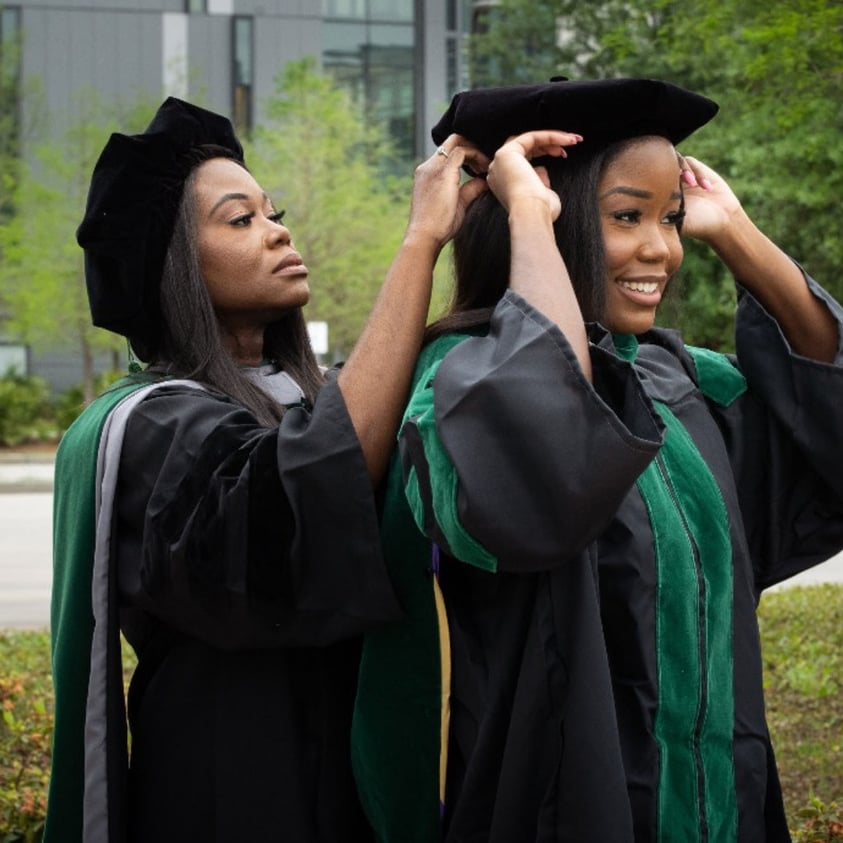
Dr. Cynthia Kudji (left) & her daughter, Dr. Jasmine Kudji.
Photo: Adrienne Battistella.
Why UMHS?
“To be honest, what really caught my eye was the whole personalized education because I felt I needed support being an older student and one that would cater to me and I was really drawn to the small class sizes,” she said. “Then when I’d go online I’d also see some of the classrooms and it looked just like the U.S. schools so I thought if I can get the support I needed and still have the standard of education we have in the U.S., it felt like it would be a great fit.”
As a nontraditional student, she knew she might face challenges.
“So, the only thing that makes it difficult as far as older students is a couple things. One, you’re further removed from the material so it’s harder to take in all the information because the depth of information you learn in medical school is just tremendous. It’s a lot. So, if you haven’t been in school for a while, it takes some getting used to the volume of material. The second thing is you still have the responsibilities of an older individual, of a mom or a dad or whatever you are. So even though I was in medical school, I was still Jasmine’s mom. So, if she needed something financially or she needed someone, I still had to be there as mom regardless of whether I was in medical school or not. Those were some of the challenges that you face as an older student versus being in your 20s in medical school without all those additional responsibilities.”
Her daughter, Dr. Jasmine Kudji, was attending med school at LSU while her mother was at UMHS in St. Kitts. It was rough at first for both of them.
“I think initially it was difficult because my mom and I have always been really close so I had to get used to the distance, we had to learn how to FaceTime and Skype each other, so we were Skyping each other every day and whenever I had struggles and she had struggles, we just had to learn to communicate from a distance,” Dr. Jasmine Kudji said. “But I think over time we figured it out.”
The mother-daughter bond they had always shared was strengthened with both attending med school simultaneously.
“I always tell people we laugh together, we study together, we cry together,” Dr. Jasmine Kudji said. “I think medical school is one of those experiences that you don’t truly understand until you’re in it. Sometimes people struggle to find someone who relates to their struggles, so for that person to be my mom was extremely helpful.”
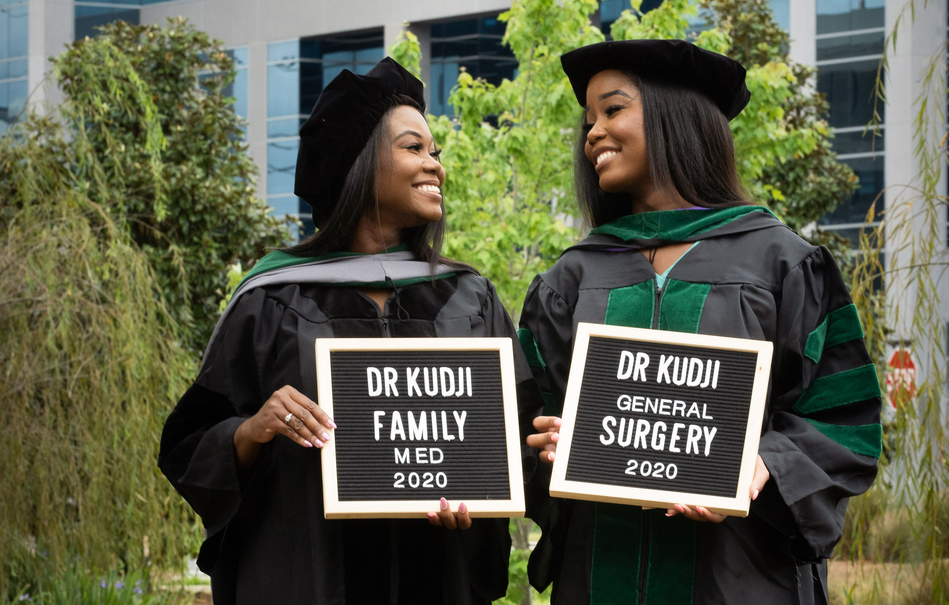
Dr. Cynthia Kudji & Dr. Jasmine Kudji.
Photo: Adrienne Battistella.
Outstanding UMHS Professors Made a Difference
Dr. Cynthia Kudji said she was privileged to have so many outstanding professors at UMHS.
“The one thing that UMHS is just profoundly so blessed to have is excellent, excellent professors,” she said. “I think they are the best professors I have ever had in any institution. I could just go on and name them all to be honest.”
Dr. Cynthia Kudji noted that although she wants to name particular professors she found especially inspiring and helpful, all of the UMHS professors she worked with really seemed to care about her as a medical student and wanted to make sure she understood the material. So, who are some of the professors who made a difference?
Dr. Veerabhadra Gowda, M.B.B.S., M.D., DCCP,
Professor of Pharmacology, ICM & Physical Diagnosis at UMHS would meet with Dr. Cynthia on Saturdays just to go over the material again. Dr. Prakash Mungli, M.D., M.B.B.S, Chairman of Molecular Sciences Course, Director and Professor of Biochemistry and Dean of Student Affairs was a phenomenal professor for Cynthia
“Dr. Mungli is so amazing, he is so positive. He’ll say ‘You can make it’ and you feel like you’re going to get through this. Very, very inspiring.”
Dr. Pinakini Shankar, M.D., M.B.B.S., Course Director and Professor of Pharmacology, was an excellent profession who “wants you to come to the office and makes extra time for you.”
Dr. Cynthia Kudji also has high praise for Dr. Yogitha Jalan B.Sc., M.Sc., Instructor of Microbiology.
“I mean he is so difficult; his course is difficult, hands down, but you know what? If you go through his course it doesn’t matter even what your grade is, you’re going to come out with so much knowledge that when you take your entrance exams and your boards, that material is just going to be burned into your head,” she said. “Even now I still go back to his notes because they are just so useful and you can just relate to it. He’s a phenomenal professor.”
Dr. Cynthia Kudji also found Thomas J. Last, Ph.D., professor of biochemistry and cell biology at UMHS, a huge help to her.
“I also would say Dr. Last because the first week that I was in St. Kitts, I was doing the regular program, the Extended Basic Sciences, and I was overwhelmed,” she said. “And when I spoke to him, he gave me the option to tailor the program the way I felt would help me. And that allowed me to take the course loads I needed so I could absorb the material and for me that was absolutely essential to my success at the institution. Because if I had not been able to tailor it– that’s part of this whole personalized education that UMHS talks about–that I was able to have that opportunity to take the curriculum and cater it to what I needed and still be successful.”
At UMHS, the professors give students lots of support and feedback and really want to see you make it. “It’s not like you’re just a number and they don’t care whether you pass or fail,” she said. “I remember one time the entire class did not do well on test. I had never, ever heard a professor say this. Dr. Nagappa said ‘I have failed you.’
“He didn’t say the class failed. He said, ‘I have failed you.’ And I just sat back and my mouth just dropped and he said ‘We’re going to go through it again and we’re going to understand this material, you’re going to learn it. And there was nothing given to us. but he felt like he did not explain it right or he was the problem. Once you get that strong foundation in basic science, and you get all of these tools and this knowledge, it carries over into your clinical experience because once you’re in clinicals and you meet these attendings and they are asking you these questions, you are able to answer the questions and you know what they are talking about. You feel so confident. You’re like ‘Oh, my God, I understand’ and you are able to relate it to a real experience. Then after you go through clinicals and then you’ll see your scores and you’ll have all As and you’re like ‘oh, my God.’ And it really allows you to have good talking moments through your residency interviews because they are looking at those scores and it just really helps you, so I think the strongest part about UMHS is its professors.”
Second Master’s Degree from Walden
Dr. Cynthia Kudji also found the second-degree option at UMHS especially beneficial.
“One thing I’ve been able to accomplish because I went to UMHS was I was able to get that other second master’s degree from Walden University and at a lot of U.S. schools you don’t get the opportunity to get the [Master’s of Science in Health Administration so I actually ended up graduating with high honors as well as getting that MHA and again that becomes a great talking point in your residency interviews,” she said. “So, it helps out a lot. They really look at it as something very, very positive and I would encourage students that are going to UMHS to look into doing another master’s program. It’s not as time consuming as you would think. The rigors of medical school are always going to be there but the way the program is set up, you can fit it in. It makes you more competitive. And on your AAMC application they ask you if you have those other degrees, so when you do, it just makes you that much more competitive.”
She also completed as Master’s in Leadership at Walden University.
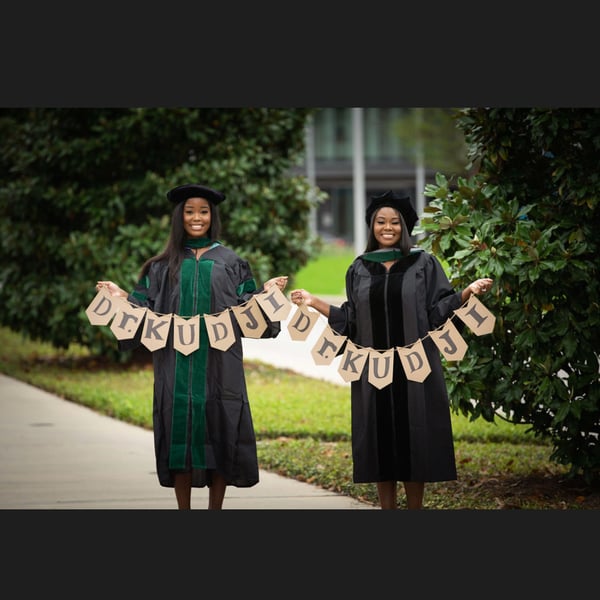 Dr. Jasmine Kudji & Dr. Cynthia Kudji.
Dr. Jasmine Kudji & Dr. Cynthia Kudji.
Photo courtesy of Dr. Cynthia Kudji.
How Do Caribbean Medical Schools Help Future Doctors?
Dr. Cynthia Kudji spoke about the many other ways UMHS helped her reach her goal of becoming a physician.
“In regards to specifically UMHS, the reputation of the school precedes you,” she said. “What I mean is when you go into your clinicals and your residency, number one you’re going to see UMHS students in those positions. Number two, they’re doing so well out there, the bar is set so high for you before you even go to a residency interview, they expect you to be great because they know that the students who came before you are excellent. So, you’re not having to prove yourself in that sense. And the other advantage is that because you went to UMHS, they know the struggles that you went through financially and being in a Caribbean school and so that is a huge talking point and a huge advantage for you because when you’re a resident there’s going to be struggles you’ll have to go through, you’re going to have to work with other team members. So, they know because you’ve conquered that, you’re a team player, it’s a plus for you to be a UMHS student even before you sit down in a residency interview or go to the clinical rotations so it’s a huge advantage for you.
Dr. Cynthia Kudji believes UMHS gave her an edge in many ways.
“With UMHS being an international school. you get exposed to all different types of cultures and people and I find that working in the clinical setting and even when you go on these residency interviews that it’s all about getting along with the people—getting along with other residents and faculty members. So, when you go to these interviews, they already know all your grades and what courses you took. They are looking for someone who is going to fit their team. I think being at UMHS, because you are already exposed to differences of opinion and culture, you are able to assimilate into whatever team or environment that you want to go into. You learn to respect people and their differences and I think you really get the opportunity to hear different perspectives because it’s an international school and that becomes very important when you are speaking to a residency program director because when they pick that up, that’s something they take notice of.”
Upcoming Family Medicine Residency at LSU
Dr. Cynthia Kudji is especially thrilled to start her Family Medicine residency at LSU.
“It’s at LSU in Lafayette, and actually it was my daughter Jasmine who told me to come out there because she was doing a rotation at LSU at the same place. She said ‘Mom, you’ve got to come to this place’ and when I got there it reminded me of a place called Charity Hospital which was the first place I worked as a registered nurse. Where everybody’s teaching you and trying to share information so when I matched there I was just thrilled because in Family Medicine I’ll have the opportunity to work in different areas of Family Medicine and all the specialty areas like cardiology and everything.”
What interests her the most about Family Medicine?
“I think the important thing is that I have choice,” she said. “That I can do ER, I can do a clinic and I think that is the reason why I chose it. I don’t have to be stuck in one field. Let’s say I get tired of doing ER, then I can go and get a job doing clinic and it’s just being versatile in a profession and it’s good when you’re an older person because sometimes you need a job that’s a little less hectic than maybe ER. I can get a job working in the clinic or something without having to be stuck in just one field.
How does it feel to match in the same hospital as her daughter?
“Absolutely amazing,” she said. “It feels amazing. I feel so blessed because she has been my security blanket and my best friend and it’s amazing to know that I can drive down to a different city and not just have to Skype her. I can talk to her. I can be around her. The other thing is going through this together we really depend on each other for information. One person may know something the other person doesn’t and we bounce information off each other and we help each other and understand whatever it is that we are going through, so to be able to continue that while you’re learning and while you’re going into residency is a huge blessing.
“For me right now the goal is to master my skills as far as managing patients and then being on the hospital floor and being in the clinic setting and really understanding what to do and how to treat. I was working as an NP before and the hardest thing with that is you don’t get the depth of knowledge as a physician. So, you’re struggling to learn concepts as you’re working but now, because of residency, I get the opportunity to apply what we’ve learned and to really hone in on good evidence-based practices whereas I didn’t get that before.
Advice for Current & Incoming UMHS Students
Dr. Cynthia Kudji has lots of pointers for current and incoming UMHS student on making the most of one’s medical education.
“I would say for new, incoming students that everything matters. That was always one of the questions I would ask when I was there when I was brand new, like do your grades matter? Do the step scores matter? The truth is everything matters. It matters what your scores are, it matters how you do on the Step exams, it even matters how you respect your professors. It matters how you carry yourself in your ethical decisions, all of that matters because when you sit down and you do your residency interviews, they will ask you about those grades. In fact, they asked me ‘well, why did you make this in this class? Why did you make this is that class?’ So, everything matters. They want that best position, that best team member, so don’t just blow things off and think ‘I don’t have to make this grade or whatever’ because it matters.”
She has many goals for residency.
“For me right now, the goal is to master my skills as far as managing patients and then being on the hospital floor and being in the clinic setting and really understanding what to do and how to treat. I was working as an NP before for about nine or 10 years and the hardest thing with that is you don’t get the depth of knowledge as a physician. So, you’re struggling to learn concepts as you’re working but now, because of residency, I get the opportunity to apply what we’ve learned and to really hone in on good evidence-based practices whereas I didn’t get that before.”
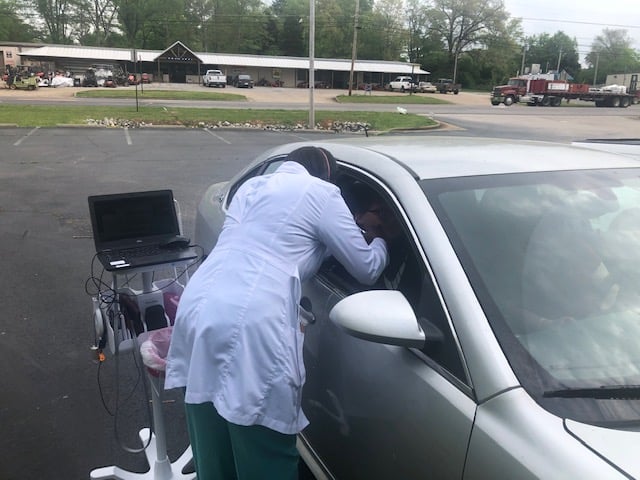 Dr. Cynthia Kudji giving a patient a COVID-19 swab test at a drive-through testing site in spring 2020.
Dr. Cynthia Kudji giving a patient a COVID-19 swab test at a drive-through testing site in spring 2020.
Photo courtesy of Dr. Kudji.
Why Are Doctors So Vital During COVID-19 Pandemic?
Regarding the Covid-19 pandemic, Dr. Cynthia Kudji feels this is such a crucial time to be a doctor for many reasons.
“I think this is a great opportunity for us to show that physicians are true leaders,” she said. “This is the point where we get to educate our patients. We get to introduce smoking cessation and show why ‘hey look, if you stop smoking and you get your glucose levels normal and let’s say you do get exposed, you have a higher chance of survival than someone whose numbers are all over the place and then gets exposed.’ So as far as being able to manage those chronic diseases and getting the opportunity to educate the public and say ‘this is why we need to get our sugars together and our numbers correct.,’ it’s also a great opportunity to show your leadership skills as a physician by educating why you need to wear your mask and what measures are needed in order to protect the public. If you can get the opportunity to go on the radio and educate the public and answer questions, it’s a great way for physicians to really get themselves out there and to show that we are the true leaders in health care.”
For now, she has mostly given patients tests for COVID-19. Recently, the clinic she works in got its first COVID-19 positive patient.
“I have two jobs. I work as an RN on the floor of a local hospital here in Alabama and I also work as a Nurse Practitioner at a rural clinic in Rogersville so as an NP, we’ve had COVID-19 patients on the floor but I have not taken care of them personally. In the clinic setting we’ve had patients that I’ve tested for COVID-19 but right now none of them have come up positive. The most I’ve done is I’ve had to quarantine families like immediate families while waiting for the COVID-19 test results. We just got our first COVID-19 positive patient in the clinic. The minute that I got the test result, it made the pandemic very real and very close to home. Often times in rural areas patients feel further removed from bigger cities but the truth is that it is here too and we must educate and protect ourselves and the public.
The national news has been full of reports of people in rural areas and smaller cities protesting lockdowns due to COVID-19 because folks in regions with fewer cases are frustrated about businesses being shut down by local officials as massive unemployment wreaks havoc on the country.
Since Dr. Kudji has been working in health care in Alabama, she has witnessed firsthand the issue of rural communities not taking the threats of COVID-19 as seriously as they should.
“That’s a huge problem for us,” she said. “In Alabama, the governor [Kay Ivey] stated that now everybody should wear masks and she pretty much opened all of the businesses and everybody’s supposed to stay inside. However, at the same time she also told the public ‘hey, it’s okay for you to go visit your loved ones…” If you go out on the street, people are not wearing a mask because they treat it like it’s the common cold or influenza but with it being really airborne, it’s an issue. So, they are not wearing masks and it takes a lot of education, especially in the rural areas because they feel safe and they feel further removed from COVID-19.”
Anxiety and depression in rural communities over the lockdowns and unprecedented unemployment has many worried.
“I do see a lot and I have had a lot of patients that I have had to place on anti-anxiety and antidepressant medications. Especially in the rural areas they are losing their jobs, they’re being laid off and so the stress level is tremendous for them and they are coming into the clinic asking for help and assistance whereas they may or may not have had health insurance and now, some of them don’t even know if their health insurance is going to last through the end of the month.”
What do medical students need to know about Covid-19 right now?
“First of all, they need to protect themselves,” Dr. Kudji said. “They have to realize that, hey look, do not put yourselves in a position where you are not protected. You are not invincible. You will get it. This is real. And it’s not worth it in the end.
“The other thing I’d say is to give accurate information. Don’t give information that you just see on Facebook, don’t give your personal opinion; make sure the information you are giving to the public is evidence based from places like the CDC. Because when you open your mouth and you are a medical student, they are going to listen to you. They are going to take it to heart. But if you say ‘hey look, this is not a big deal,’ that’s how they are going to behave. This is the best opportunity to really show your leadership skills even as a medical student, you are an agent of change. With every tragedy, you can make it into an opportunity because what’s going to happen is when you go into residency, when you do your interviews, they’re going to ask you how did you contribute and make a different during the COVID-19 pandemic? So, if you can make masks, make masks. If you can find socks for the homeless, do that. If you can babysit or do something to volunteer your time or something for the hospitals because we are all saying we’re here because we want to help people so this is the time to show it. I promise you, when it comes to residency interviews, they’re going to ask you ‘how were you a leader in COVID-19’?”
African Americans & COVID-19
The media has reported higher rates of death and infection among communities of color, particularly African Americans, and COVID-19. Dr. Cynthia Kudji offered her thoughts on the subject.
“It’s a lack of education,” she said. “A lot of times we kind of take it for granted, especially with the African American population, just how sensitive the topic can be regarding protective wear. I read an article talking about African American males who a lot of times they are going into the stores, wearing their masks, but they are being targeted as criminals because they fit a certain profile. So now they are afraid to wear the protective wear in public. So, what are they doing? They’re exposing themselves to prevent being profiled. Despite these unfair situations, as a provider, at the same time you still have to educate the public and you still have to get them to wear the masks and the gloves and give them the information and the rationale behind your recommendations. As a provider you have to explain that it is not just a choice to wear the protective wear but it is a life changing decision not to wear one because it doesn’t just affect you but everyone, including your family that you are around.
“Sometimes it’s just miscommunication. They’ll see things on Facebook and they’ll say ‘Well, the masks don’t really work.’ Or ‘as long as I’m six feet away, I can still go wherever I want to go.’ And ‘why does my son have to stay in the house all day? He’s 20 years old and he can’t go by his friend’s house?’ You have to explain that as a healthcare provider. A lot of times, even with an African American community, when it comes to medicine there is a lot of mistrust there between them as patients and the provider (replace this sentence with red sentence). Due to events such as the Tuskegee Experiments that occurred in the not-so- distant past, there is a lack of trust of Medicine in the African American community. Because they don’t know whether or not you are telling them the truth. They may think you’re giving them a pill because, as a provider, you’re going to make money off of the medication. One thing about the African American community that I will say is when they pick up on the sincerity of what you are telling them, they will protect themselves and their families. You have to explain why this population is so vulnerable and really bring it home. Then you can arm them with information on how to protect themselves by addressing those chronic diseases like HTN and diabetes. But you’ve got to talk to them and be open with them. Sometimes I just pull up the CDC website and I literally read it [to them], to show them that, I’m not making this up. But that’s what it takes. And sometimes it even takes going to the churches and trying to explain to your pastors and asking them if you, can share this information with their congregation? If you can win them over, and it comes through them, [it’s more effective sometimes].”
Her daughter, Dr. Jasmine Kudji, echoed her mother’s sentiments about educating the black community about COVID-19.
“I also think that this is really an important time to explain why African Americans are more likely to have serious complications from COVID-19,” she said. “I think it’s a great time to shine a light on the causes of diabetes and high blood pressure and heart disease in our communities and show that our daily actions and diet contribute to our health disparities and how going forward we can try to improve our own health and try to prevent anything like this from happening again.”
Dr. Jasmine Kudji said she believes lack of adequate health insurance is definitely a factor among African Americans as a medically underserved community facing the pandemic.
“I definitely think that lack of insurance contributes [to disparities],” she said. “When you’re not benefitting from the full realm of health care, you’re definitely going to suffer in times like this. However, there is more to it. I definitely think lack of access to healthcare, lack of access to healthy foods, and other social determinants of health contribute to African Americans being affected the worst by COVID-19.”
Starting Residency in Louisiana During the Pandemic
Both Dr. Cynthia and Dr. Jasmine Kudji are starting their residencies at LSU in Louisiana, and the New Orleans area has been called a COVID-19 “hotspot” by public health officials. Both doctors have concerns about providing health care to the people of Louisiana during this pandemic.
Dr. Jasmine Kudji spoke in detail about her concerns for folks in Louisiana.
“I think primarily for Louisiana, for our culture, we like to be out and about,” she said. “We like to visit each other. We’re very social people so I think It’s been very difficult in this city in particular for people to socially distance effectively even though we’ve been trying our best. I do think that like any other city, in New Orleans we’re seeing an increase in cases and just like in other hospitals our healthcare staff, they don’t have a lot of PPE and as a result that’s also contributing to an increased amount of cases in healthcare workers. I definitely think it’s going to be a challenge to get the number of cases down. And to also just have people understand the importance of continuing the social distancing even past the mandated April 30th date.”
Like her mother Cynthia, Dr. Jasmine Kudji also believes this is a critical time to be in medicine.
“I think it’s a crucial time to be a physician now because this situation is shining light on some things that physicians had issues with before the pandemic like the lack of ventilators or not having enough staff members to care for our patients,” she said. “I think this is going to be a pivotal time for our physicians to promote positive change in our healthcare system, and it will give us a chance to really express our concerns and I think this time around, it will be received better.
Has she had any experience working with COVID-19 patients yet?
“I have not. Since I didn’t have a true medical career before entering medical school, this is going to be my first time on July 1st. My school made it very clear that they did not want us to volunteer just to protect ourselves because as an incoming medical intern, you’re still learning and they want to make sure we have the full opportunity to learn while being as safe as possible.”
What are things medical students need to know about COVID-19?
“I agree with what my mom said,” Dr. Jasmine Kudji said. “The most important thing about a virus that is airborne is understanding how to protect yourself and how to protect your patient. When I was on my rotation during my third year, there were a lot of times when we had patients with GI [gastrointestinal] infections or any sort of infection, we had to learn how to effectively use the protective equipment and I think that as an incoming medical student, it is important to understand the patho-physiology of viruses and diseases and how things are spread and what you need to do to protect yourself as a physician.”
Doctors Cynthia & Jasmine Often Mistaken for Sisters
Because both women look so young, it’s often hard to tell them apart. Do people mistakenly think they are sisters?
“All the time,” Dr. Cynthia said with a big laugh. “I’ll take it. I’ll take it.”
Dr. Jasmine added, “I’ll never forget when my mom came to lunch with me my freshman year of college and the guys were like ‘who’s this new girl?’ “
Both mother and daughter really helped each other along the way through medical school.
“The last thing I’d say is I’m so very, very blessed and grateful to have my daughter,” Dr. Cynthia said. “I just think she’s smart and beautiful and it’s been such a tremendous blessing to have her because like she said, when I was studying, I struggled so much with my Step 1. I had so much help from her and from UMHS.
“I should mention Mia Jaworski, a staff member in Maine. Mia actually would call me and give me help. She is phenomenal. Because it took me so long to study for Step 1 and I struggled with it. I passed it and everything but I got so much support from Mia and from Jasmine with Step 1 and with Step 2.
“I remember even when I was studying Step 2, I had taken the practice test and had actually failed the practice test that the school makes you take. I remember Jasmine saying ‘how are you studying for this?’ So, when I told her she said, ‘Oh, no, no, no, I want you to do it this way’ so I said, ‘Jasmine, I am not you. I am in my 40s. I can’t do it like you.’ And she said ‘Mom, you taught me how to study and I know the way you think so do it this way.’ Literally what she was telling me to do was the opposite of what everyone was telling me to do. But I did it and I ended up going up over 30 some points higher than even my step 1 exam.”
Dr. Cynthia Kudji credits her parents, daughter Jasmine and the faculty and staff at UMHS for making everything possible.
“To be honest, I could never have ever done it without her in this program and my family and my friends,” she said. “My dad took out a loan on his house, my mom and dad took out a loan on their house to get money to pay for tuition so we’ve been supported in so many ways that we owe so much to family and friends in our community. This journey has been absolutely amazing and our success is truly a testament to the education that I received at UMHS hands down.”
(Top photo): MOTHER & DAUGHTER DOCTOR DUO: UMHS 2020 graduate Dr. Cynthia Kudji (left) & her daughter, Dr. Jasmine Kudji. Both women attended med school at the same time & matched in the same hospital system, LSU Heatlh. Photo: Adrienne Battistella.
About UMHS:
Built in the tradition of the best U.S. universities, the University of Medicine and Health Sciences focuses on individual student attention, maintaining small class sizes and recruiting high-quality faculty. We call this unique approach, “personalized medical education,” and it’s what has led to our unprecedented 96% student retention rate, and outstanding residency placements across the USA and Canada. UMHS is challenging everything you thought you knew about Caribbean medical schools.
Please check out some of our other popular blog posts:
| Pathology medicine | Hospitalists | What are symptoms of Brain fog |
| Covid 19 and sore throat | D.O. versus M.D. | Starting Medical school at 30 |

Scott is Director of Digital Content & Alumni Communications Liaison at UMHS and editor of the UMHS Endeavour blog. When he's not writing about UMHS students, faculty, events, public health, alumni and UMHS research, he writes and edits Broadway theater reviews for a website he publishes in New York City, StageZine.com.













